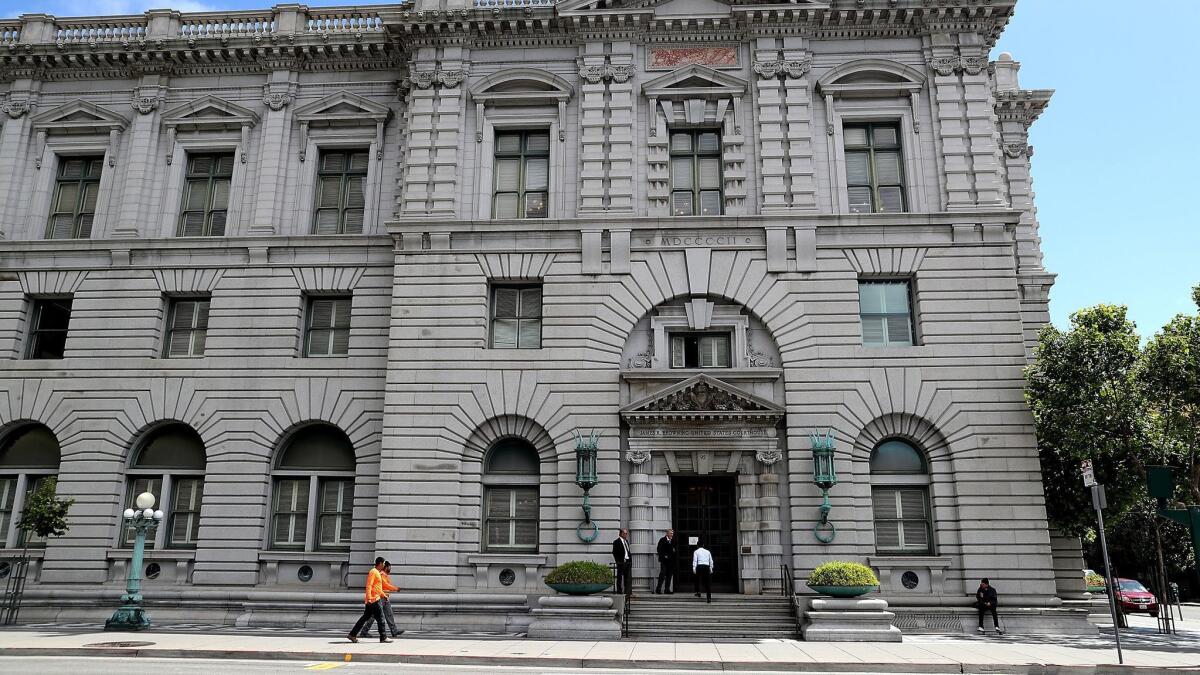How the shutdown is hitting federal courts and law enforcement in California

Private criminal defense lawyers appointed to defend the poor in federal courts in California have not been paid since Christmas Eve.
If the federal government shutdown continues into next month, federal jurors in California may not receive their pay or be reimbursed for expenses until the government reopens.
An association that represents FBI agents says the shutdown has impeded investigations, making it impossible to pay some confidential sources or forensic experts.
Still, the doors to federal courthouses in California will remain open, even when funding scraped from fees and other sources dries up next month.
“We are fortunate that the judiciary has been able to maintain operations and that people have been paid,” David Madden, a spokesman for the San Francisco-based U.S. 9th Circuit Court of Appeals, said Thursday. “The courts will continue to fulfill their constitutional duties for as long as they are able.”
The uncertainty over the length of the shutdown nags, though. “We have never been down this road before,” Madden said. “Who knew it was going to be this long?”
The U.S. Department of Justice has said that law enforcement will continue working, though federal lawyers are asking that civil cases be postponed until the government reopens. The government plans to pay back all workers who have gone without paychecks, regardless of whether they worked without pay or were furloughed.
Rukelt Dalberis, a spokesman in the FBI’s Los Angeles bureau, declined to answer questions about the shutdown’s impact on the bureau’s investigations and operations, citing an order issued bureau-wide not to disclose such details publicly.
In a statement from the agency’s headquarters in Washington, officials said, “FBI operations are directed towards national security and violations of federal law, and must be able to continue during a lapse in appropriations. As such, all FBI agents and support personnel in field offices are considered excepted from furlough.”
Earlier this week, the association that represents FBI agents, who are working unpaid, released a report warning of the deepening impact the shutdown is having on investigations.
Unnamed agents said the shutdown had hamstrung them in several ways, according to the report.
Agents working on Native American reservations, for example, said they had been prevented from seeking warrants and indictments from grand juries, and that they no longer had access to specialists who perform forensic evaluations of victims in child sex assault cases.
A team of agents working on a large narcotics investigation was unable to pay informants or conduct undercover drug deals, the report said.
One agent cited in the report coordinates a terrorism task force. He said the inability to pay confidential sources has meant “we have lost several sources who have worked for months, and years, to penetrate groups and target subjects.”
The Justice Department has said its civil litigation staffing has been trimmed “to the minimum level needed” to comply with court orders and protect life and property.
The Los Angeles-based U.S. Attorney’s office said that 70% of its civil lawyers have been furloughed and three-quarters of pending civil cases have been put on hold.
“The overwhelming number of people working every day are not being paid,” said Thom Mrozek, a spokesman for the office.
The Administrative Office of the U.S. Courts has managed to pay court staff and keep operations afloat by deferring non-critical expenses and using court filing fees and other funds.
But the office said the money would run out Jan. 31 and asked courts to develop contingency plans. The federal district courts in California plan to remain open, with employees working without pay, until the government reopens.
The 9th Circuit will continue to hold hearings, and attorneys will continue to file their briefs electronically.
District and 9th Circuit judges also will be paid, as required by the U.S. Constitution, and federal law says that bankruptcy judges and magistrates may not be furloughed without pay.
Still, Madden said some 9th Circuit courthouses could be shuttered on days when no hearings are scheduled
Delays in covering jurors’ expenses, including hotel costs if overnights are required, also might make it difficult for jurors to report for service, he said.
Courts will have to stop holding naturalization ceremonies and various training and education programs, he added.
Noting that court employees are uncertain about the future, Madden said “everyone is tightening their belts.”
Daniel Spohr-Grimes, a spokesman for the Sacramento-based federal Eastern District court, said workers “are all painfully aware of the situation.”
“We are all doing what we need to do to support our families and maintain our lives as best we can” if the paychecks stop, he said. “We are hoping it doesn’t get to that.”
He noted that California state government will offer unemployment benefits to unpaid federal workers on the condition the money be repaid once the federal government reopens.
Some utilities and mortgage companies also are willing to allow deferred or reduced payments to unpaid federal workers, he said.
Twitter: @mauradolan
More to Read
Sign up for Essential California
The most important California stories and recommendations in your inbox every morning.
You may occasionally receive promotional content from the Los Angeles Times.












